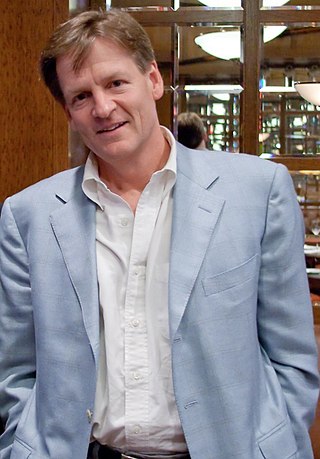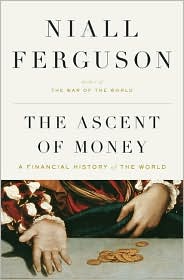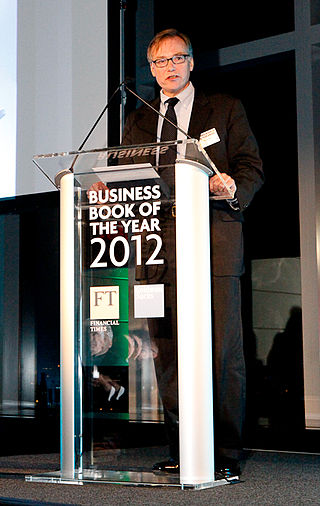
The dot-com bubble was a stock market bubble in the late 1990s. The period coincided with massive growth in Internet adoption, a proliferation of available venture capital, and the rapid growth of valuations in new dot-com startups.

In economics, Kondratiev waves are hypothesized cycle-like phenomena in the modern world economy. The phenomenon is closely connected with the technology life cycle.
Harry Shuler Dent Jr. is an American financial newsletter writer. His 2009 book, The Great Depression Ahead, appeared on the New York Times Bestseller List.
The Austrian business cycle theory (ABCT) is an economic theory developed by the Austrian School of economics about how business cycles occur. The theory views business cycles as the consequence of excessive growth in bank credit due to artificially low interest rates set by a central bank or fractional reserve banks. The Austrian business cycle theory originated in the work of Austrian School economists Ludwig von Mises and Friedrich Hayek. Hayek won the Nobel Prize in Economics in 1974 in part for his work on this theory.

A financial crisis is any of a broad variety of situations in which some financial assets suddenly lose a large part of their nominal value. In the 19th and early 20th centuries, many financial crises were associated with banking panics, and many recessions coincided with these panics. Other situations that are often called financial crises include stock market crashes and the bursting of other financial bubbles, currency crises, and sovereign defaults. Financial crises directly result in a loss of paper wealth but do not necessarily result in significant changes in the real economy.

Bloomberg News is an international news agency headquartered in New York City and a division of Bloomberg L.P. Content produced by Bloomberg News is disseminated through Bloomberg Terminals, Bloomberg Television, Bloomberg Radio, Bloomberg Businessweek, Bloomberg Markets, Bloomberg.com, and Bloomberg's mobile platforms. Since 2015, John Micklethwait has served as editor-in-chief.

Michael Monroe Lewis is an American author and financial journalist. He has also been a contributing editor to Vanity Fair since 2009, writing mostly on business, finance, and economics. He is known for his nonfiction work, particularly his coverage of financial crises and behavioral finance.

Jason Starr is an American author, comic book writer, and screenwriter from New York City. Starr has written numerous crime fiction novels and thrillers.

Observers and analysts have attributed the reasons for the 2001–2006 housing bubble and its 2007–10 collapse in the United States to "everyone from home buyers to Wall Street, mortgage brokers to Alan Greenspan". Other factors that are named include "Mortgage underwriters, investment banks, rating agencies, and investors", "low mortgage interest rates, low short-term interest rates, relaxed standards for mortgage loans, and irrational exuberance" Politicians in both the Democratic and Republican political parties have been cited for "pushing to keep derivatives unregulated" and "with rare exceptions" giving Fannie Mae and Freddie Mac "unwavering support".

The Great Recession was a period of marked general decline observed in national economies globally, i.e. a recession, that occurred from late 2007 to 2009. The scale and timing of the recession varied from country to country. At the time, the International Monetary Fund (IMF) concluded that it was the most severe economic and financial meltdown since the Great Depression. One result was a serious disruption of normal international relations.

The Ascent of Money: A Financial History of the World is a 2008 book by then-Harvard professor Niall Ferguson, and an adapted television documentary for Channel 4 (UK) and PBS (US), which in 2009 won an International Emmy Award. It examines the long history of money, credit, and banking.
John Brooks was a writer and longtime contributor to The New Yorker magazine, where he worked for many years as a staff writer, specializing in financial topics. Brooks was also the author of several books, both fiction and non-fiction, the best known of which was an examination of the financial shenanigans of the 1960s Wall Street bull market.

Many factors directly and indirectly serve as the causes of the Great Recession that started in 2008 with the US subprime mortgage crisis. The major causes of the initial subprime mortgage crisis and the following recession include lax lending standards contributing to the real-estate bubbles that have since burst; U.S. government housing policies; and limited regulation of non-depository financial institutions. Once the recession began, various responses were attempted with different degrees of success. These included fiscal policies of governments; monetary policies of central banks; measures designed to help indebted consumers refinance their mortgage debt; and inconsistent approaches used by nations to bail out troubled banking industries and private bondholders, assuming private debt burdens or socializing losses.

Financial Times Business Book of the Year Award is an annual award given to the best business book of the year as determined by the Financial Times. It aims to find the book that has "the most compelling and enjoyable insight into modern business issues". The award was established in 2005 and is worth £30,000. Beginning in 2010, five short-listed authors each receive £10,000, previously it was £5,000.
Jón Ásgeir Jóhannesson is an Icelandic businessman and former CEO of Baugur Group.

Flash Boys: A Wall Street Revolt is a book by the American writer Michael Lewis, published by W. W. Norton & Company on March 31, 2014. The book is a non-fiction investigation into the phenomenon of high-frequency trading (HFT) in the US financial market, with the author interviewing and collecting the experiences of several individuals working on Wall Street. Lewis concludes that HFT is used as a method to front run orders placed by investors. He goes further to suggest that broad technological changes and unethical trading practices have transformed the U.S. stock market from "the world's most public, most democratic, financial market" into a "rigged" market.

How Markets Fail: The Logic of Economic Calamities is a book by economist and journalist John Cassidy. The book was published in 2009 by Farrar, Straus and Giroux.

The Greatest Trade Ever: The Behind-the-Scenes Story of How John Paulson Defied Wall Street and Made Financial History is a debut non-fiction book by American journalist Gregory Zuckerman. The book was released on November 3, 2009, by Crown Business. The book investigates the reasons and consequences of the subprime mortgage crisis and the role that hedge fund manager John Paulson played in those events.

Alejandro Carlos "Alec" Oxenford is an Argentine entrepreneur. He co-founded OLX, and co-founded letgo, a mobile classified ad app in the United States.















